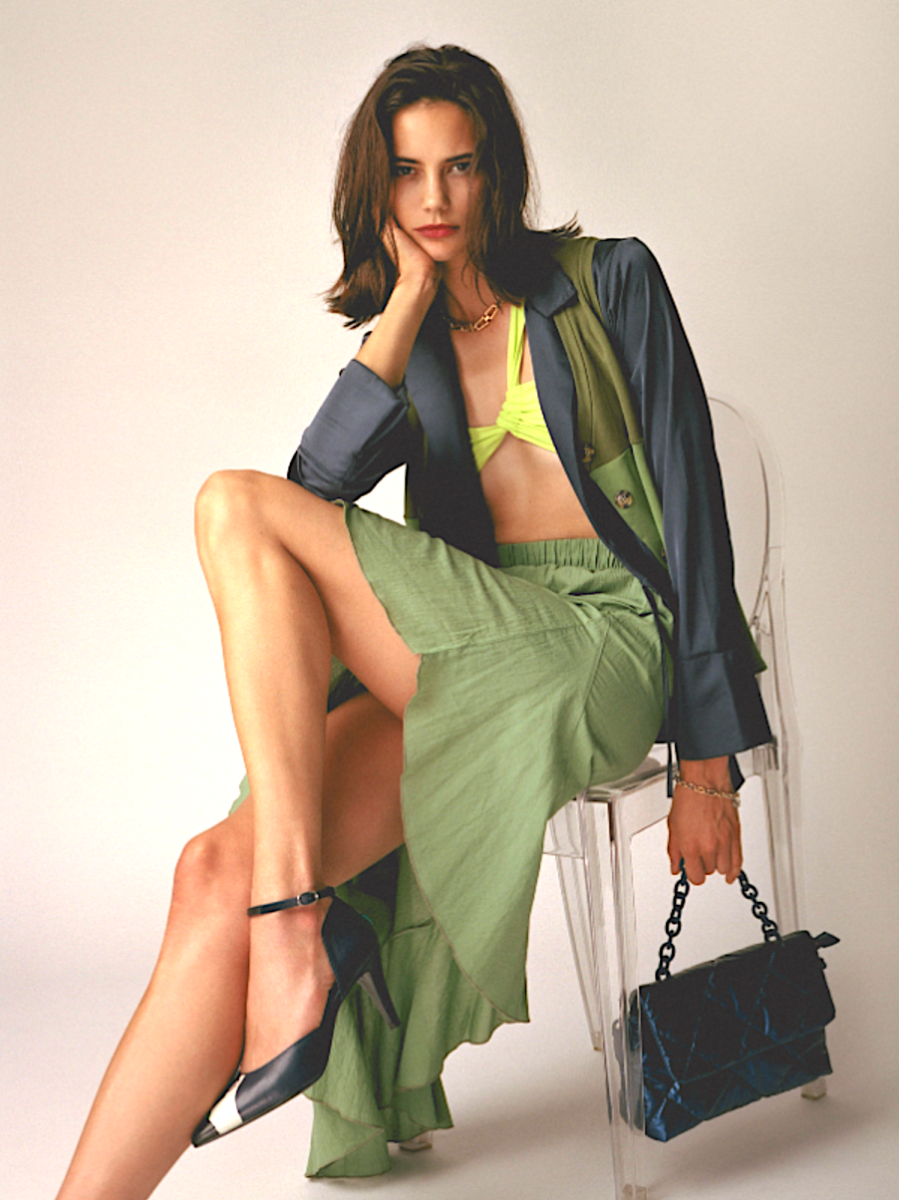Joie LaFentz Shares How Her Brand Is Ethically Made In The U.S.A

Share This Article
Joie LaFentz shares the steps she takes to ensure that JOLA, her collection of modal and organic cotton blouses are sustainably and ethically-made.
| All products featured on The Wellness Feed are independently selected by our editors for their environmental and ethical impact. However, we may earn an affiliate commission when you buy something through our retail links. |
Joie LaFrentz keeps much of the sourcing and manufacturing for her line of women’s blouses in the U.S. When the local Iowa mom set out to turn her sketches of day-to-night blouses into samples, she turned to a manufacturer in Texas. Not only was it a short trip (reducing her CO2 emissions) but she was able to ensure that her brand, JOLA, is made in a factory that meets ethical standards. After all, it’s important to Joie that her line of blouses isn’t simply made with sustainable Oeko-Tex certified fabrics, but that that ethos of doing good is extended to the artisans sewing her designs to life. She’s proud to present her made-in-the-USA label knowing that living wages, benefits, and safe work conditions are upheld.
Click to read more…
Timeless styles deserve timeless fabrics that feel better with time. Modal just feels better (now and after a few washes). The fabric flows against your skin with a softness that is somewhere between organic cotton and silk. Along with bamboo and organic cotton, it’s one of the fabrics JOLA uses, and it’s the star fabric of the Pajama Top. Aptly named, the top flows like the fabrics you slip on when you’re ready to relax after a long day. But, the structure of being a button-up makes it just clean-cut enough to wear outside. Weave in the bright sunny hue that will leave you smitten with compliments, and you have the recipe for a top that you’ll love wearing all day long. Seriously, there’s just something about bright hues that people love.
As a new made-in-the-U.SA brand, Joie shares how she purposefully crafts her collection of women’s blouses. Like many new entrepreneurs, her journey into the sustainable business space began with education and is continuously evolving as the fashion industry itself learns how to become more sustainable.
It Starts With Sustainable & Ethical Partnerships
When I began researching the best ways to start an ethically-minded fashion clothing line, I came across a program called Factory 45. It is an online self-paced program that takes sustainable fashion entrepreneurs from idea to launch. Enrolling in it was the best first step I could have taken for JOLA as it put me in contact with other like-minded business owners around the world who were experiencing a lot of the same frustrations and issues I was facing at the time. It also provided me with resources and lists of fabric suppliers, pattern makers, manufacturers, packaging suppliers, and more. Factory 45 was the biggest jumpstart that allowed me to move forward efficiently and stay on an upward track.
Sourcing Sustainably
I needed colorful fabric as JOLA shirts are all about color and how those colors can positively impact our days. From the start, I realized that a lot of the sustainable fabrics I was finding came in more neutral shades like whites, grays, and beige. Understandably, many bright fabrics are dyed with various chemicals, but I was able to find a few different fabric lines that were made using OEKO-TEX® Standard 100 fabrics.
Your Buzzword Breakdown: What Makes Environmentally Friendly Clothes Eco?
Click to read more…
They also were soft and wearable, which was a must for the shirts I wanted to create. I found two styles of buttons that I currently still use in two of my styles. One is made from corozo, which is much stronger than plastic and eventually will biodegrade decades from now. The other is made from upcycled horn that has been discarded naturally. The JOLA labels and the fabric labels used inside JOLA shirts are also made from recycled materials.
Off to the Sample Maker
Once I had all my fabrics and notions, I sent everything to my sample maker in Texas. It was important to me to use a small company in the USA to save time and that I could easily visit. My sample maker connected me with a small manufacturer in Texas that employs a small number of seamstresses (5-10) who all earn fair remuneration, have decent working hours, and have a safe and hygienic workplace. Also, there is no discrimination or child labor. We manufacture in small batches too so that we aren’t ordering more than we can sell.
Preparing JOLA Orders
When an order for a JOLA shirt is placed, I attach hang tags made from recycled paper and wrap them in recycled tissue paper. Depending on how large the order is, I either ship them in padded mailers made with recycled materials or in boxes that I’ve collected and am upcycling. Small and thoughtful steps help me to save on costs and reduce waste. While there is no such thing as a totally sustainable clothing line, JOLA continues to strive to adhere to the beginning practices and ideals I started the business with almost three years ago.




1 Comment